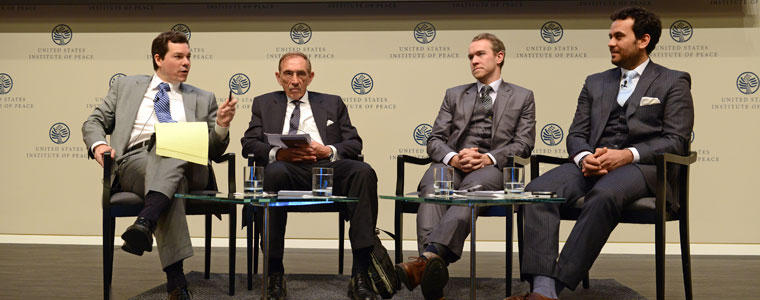First Impressions of the Afghan Elections: Field Reports and Analysis from Kabul and Washington
Read the Event CoverageOn Wednesday April 9, 2014, the U.S. Institute of Peace hosted one of the first public discussions with experts examining the first reports out of the April 5th elections in Afghanistan.

Presidential and Provincial Council elections in Afghanistan were held on Saturday, April 5, 2014. The campaign has generated widespread enthusiasm among Afghans, and the political stakes are high. Across the country, millions of Afghans cast their ballots in what will be the country’s first democratic transition of power.
On Wednesday morning, April 9th, USIP hosted a group of experts to provide their first impressions and initial analyses. First, Kabul-based experts, led by USIP Country Director Shahmahmood Miakhel offered their opinions from Kabul by videolink. Then a Washington-based panel added their views and took questions from the audience. The Washington-based panel was led by Scott Smith, director for Afghanistan & Central Asia Programs at USIP.
Take the opportunity to gain a well-informed analysis of the elections, how they went, and what they might mean for Afghanistan’s future by watching the event recording below. Continue the conversation on Twitter with #USIPAfghanistan.
Speakers
Hamid Arsalan, Discussant
Program Officer, National Endowment for Democracy
Washington, D.C.
Najla Ayubi, Discussant
Deputy Country Representative, The Asia Foundation
Kabul
Jed Ober, Discussant
Director of Programs, Democracy International
Washington, D.C.
Peter Manikas, Discussant
Senior Associate & Regional Director for Asia Programs, The National Democratic Institute
Washington, D.C.
Shahmahmood Miakhel, Discussant
Afghanistan Country Director, U.S. Institute of Peace
Kabul
Nader Nadery, Discussant
Chairman and Founder, Free & Fair Election Forum of Afghanistan
Kabul
Nargis Nehan, Discussant
Executive Director, Equality for Peace and Democracy
Kabul
Scott Smith, Moderator
Director, Afghanistan & Central Asia Programs, U.S. Institute of Peace
Washington, D.C.



